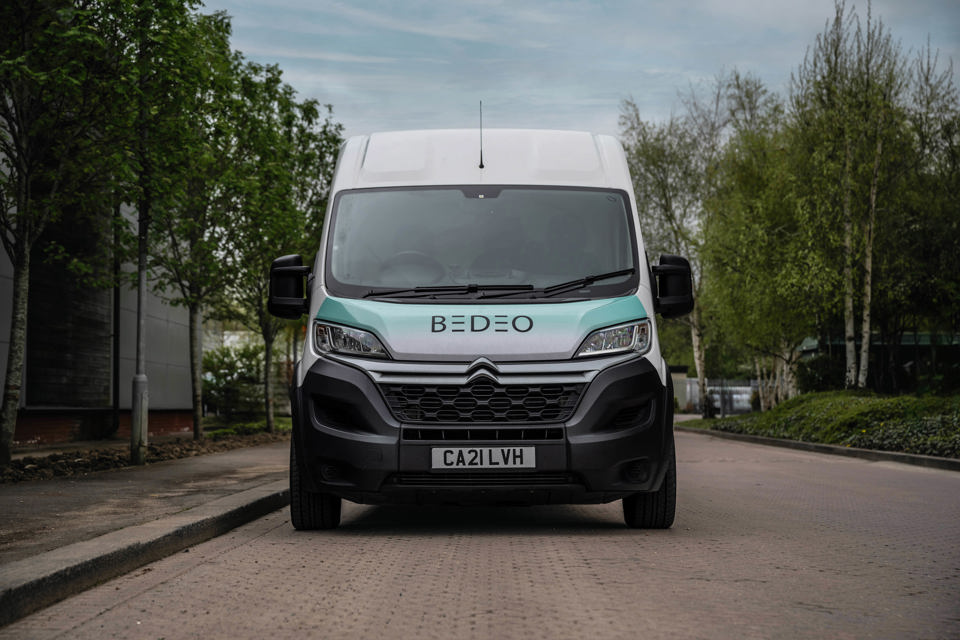Major policy gaps in the UK electric vehicle (EV) retrofit market have been revealed in a new whitepaper published by Bedeo today (Tuesday, June 4).
The whitepaper, titled ‘Accelerating the Transition, Supporting our Businesses: Enabling Low-Emission Fleets with Retrofit Electrification’, underscores the need for introducing incentives for those looking to retrofit, and for retrofitters to be tighter regulated and scrutinised on safety and quality standards.
Retrofitting is already popular and well subsidised in other European countries such as France. It’s a process that converts used internal combustion engine (ICE) vehicles to run on electric power, and a proven accelerator in the adoption of EVs, says Bedeo.
Not only is retrofitting a vehicle to run on electric power proven to extend the life of that vehicle, it also increases its residual value, making it a competitive alternative to buying a new electric van, it argues.
Additionally, this approach reduces the total cost of ownership (TCO) as well as the financial burden of buying a brand-new EV while minimising environmental impact; especially for vehicles in this category with major-built-ons in the back of the vehicle, such as refrigeration units, minibus conversions and many other rear fit-out applications.
Despite these benefits, the retrofit market is perceived to be lacking in the UK, in a landscape ripe for potential that presents a promising opportunity, ready for smart incentives and enhanced regulation, as emphasised in the whitepaper, says Bedeo.
Bedeo founder, Osman Boyner, said: “Retrofit is going to be important in our (the UK’s) quest for not only a circular economy, but also to adopt electrification, and I’m surprised they (the UK Government) aren’t doing more to support it.
“When you look at how popular Vinted and eBay are for fashion – why can’t we do that with cars and vans? Why do we have to just buy new?”
While currently still small-scale in the UK, companies like Bedeo are putting retrofit on the map through its OEM-grade Reborn Electric programmes.
These programmes use in-wheel motors (from group company, Protean Electric) to enable the electric powertrain conversion, as well as proven, turn-key batteries and chargers, trusted by Stellantis and other large suppliers, from Bedeo direct.
In the whitepaper, Bedeo highlights that not only is the UK Government not investing in financial incentives for owners looking to retrofit their used cars, they are also not regulating the industry in terms of safety or best-practice in quality standards.
Boyner warned: “At Bedeo and Protean Electric, we have been undergoing our own extensive testing and validation of our retrofit solutions before offering them to fleets and private customers.
“The retrofit market is a bit of a ‘wild west’ at the moment – anyone could take a used EV platform, add it to a vehicle and offer it for sale. They do not have to undergo any testing or validation, and if it’s for a classic vehicle, no MOT would be needed, either.”
He added: “Electric retrofit deserves to have its own regulation, terms and conditions to meet before converting a vehicle and putting it on the road, for the sake of other drivers and occupants of the vehicles.
“As such, I don’t think electric retrofit is taken as seriously here in the UK, hence it being swept to the side in terms of not only safety but also subsidies.
“Retrofit is a missing link in the electrification roadmap, but to accelerate growth, the government needs to support and regulate it correctly.”
The whitepaper concludes with a call to action for policymakers, industry stakeholders, and fleet operators in the UK to prioritise investment in retrofit technologies.
By embracing retrofit solutions, the UK can mitigate the environmental impact of diesel vans and passenger cars, improve air quality, and accelerate progress towards a greener, more sustainable future, says Bedeo.
To access the full whitepaper and learn more about the imperative for investment in retrofitting solutions, click here.

























Login to comment
Comments
No comments have been made yet.